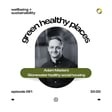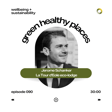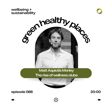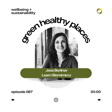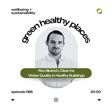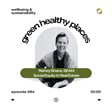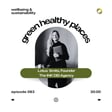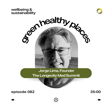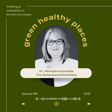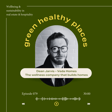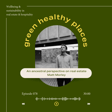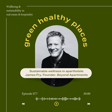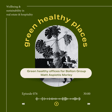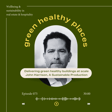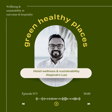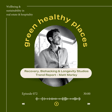Introduction to Episode 69
00:00:11
Speaker
Welcome to Episode 69 of the Green Healthy Places Podcast, in which we discuss the themes of well-being and sustainability in real estate and hospitality today.
Guest Introduction: Mark Myers
00:00:21
Speaker
I'm your host, Matt Morley, and today we're talking to Mark Myers, Hospitality and Project Director of Extreme Destinations.
Mark Myers' Sustainability Journey
00:00:29
Speaker
It's currently based in Norway and has an extensive professional background in sustainability and tourism.
00:00:35
Speaker
Previously, he worked in Durban, South Africa, for the M. Schlanger Tourism, as well as his own Sustainably Farmed Ingredients business.
The Mission of Extreme Destinations
00:00:43
Speaker
He's managed safari lodges in Uganda, helped reintroduce heritage grains into the sustainable food economy in Norway, and today is charged with the Xtreme brand's mission to drive positive change through both Xtreme and Adventure Sports, specifically via the development of Adventure Sports Parks
00:01:02
Speaker
themed hotels, lodges, camps, and centers of excellence. Mark, thanks for joining us.
The Evolution of Xtreme: From TV to Social Media
00:01:08
Speaker
Thanks, Matt. What a great introduction as well. There you go. A broad range of background experiences, which you can obviously understand as well. I love it. It's great. But perhaps we've looked at what you've done, but for those perhaps less familiar with the Xtreme brand itself, could you just give a quick overview to that business and the sectors it's currently playing in and its recent move into hospitality?
00:01:32
Speaker
Yeah, I mean, Xtreme as a brand has been around for over 25 years. It was started by Alastair Gosling and really centered around Xtreme Sports and providing a kind of a media outreach for that. So he raised some investment capital, developed the sports channel Xtreme Sports, which then became a global phenomenon.
00:01:55
Speaker
It was then launched in a range of countries at a massive following and fan base over a range of TV networks and channels. And he ran that very successfully for many, many years. And then he saw the indication of social media and everything moving on to YouTube and other platforms.
Sports Infrastructure and Management Plans
00:02:12
Speaker
And he decided to sell the channel and then move more into the media element, the social media element and publishing on that side, I think. Raised a lot, obviously, with ambassadors he's worked with.
00:02:24
Speaker
And from that point on, he moved on and developed a fan base around 20 million followers, has up to 200 million views per month with most of the channels he's operating. And then at the same time developed the events business, which supports a lot of the larger extreme sports events. And that has really kind of driven the growth towards destination relationships as well.
00:02:48
Speaker
So from the event business, the destinations business was developed probably around six years ago. And they started developing a lot of management plans for destinations with regards to tourism, sports and adventure infrastructure.
Xtreme's Shift to Hospitality
00:03:03
Speaker
So providing the capabilities for a variety of destinations to develop those kind of facilities.
00:03:09
Speaker
that then supports the growth of sports, adventure-based sports, action sports and extreme sports as part of the overall tourism offering. So really he's grown the company into that level and I'm now working with extreme destinations as we move away from just consultancy towards operations within the hospitality sector. So it is a move into becoming effectively developer and hotel management company operator.
00:03:35
Speaker
Yeah, I think they've gone really into the design, build and operate. And the reason being is, you know, it's much better when you're kind of providing the design element, the consultancy element when you actually operate. So we always said the proof is in the pudding and operationally, I think that's been always one of the main objectives. The destination team has actually developed their own kind of design brand and also their kind of their own offering with regards to the adventure tourism industry and the types of activities they provide.
00:04:03
Speaker
One can think of similar examples even that I've been involved in in the past where, let's say, a luxury fashion brand decides to move into the hospitality space. And then there's a strategic piece of work that goes on at the front end around, well, you design clothes and you do a little bit of interior design. How do you translate that? How does that morph across into a hospitality experience?
Competitors in Adventure Tourism
00:04:24
Speaker
I think what's interesting about the extreme case is that
00:04:27
Speaker
you're all about primarily it was communicating experiences but laterally it was about creating experiences and with a specific angle on that around adventure sports and extreme sports so you already have the know-how and the expertise and the kudos within the industry established around creating experiences for that it then becomes well how do you create a permanent space a home for those experiences and when we look around in the industry we're there
00:04:56
Speaker
Was there an existing competitor set of their brands that popped up that you felt, well look, this is happening already and we're just in time to catch the wave? Or did you feel like we think this is going in that direction and we need to set the trend for ourselves?
00:05:12
Speaker
Yeah, look, I mean Red Bull, a great example of, you know, obviously a brand moving straight into the extreme sport element, developing a range of events and experiences. And I think they've always been someone or a company that we've looked up towards, you know, obviously because of their kind of communication platform and the way that they've utilized all of that with regards to their product.
Media Integration in Hospitality
00:05:32
Speaker
So that's a very good starting point. But generally the industry itself with adventure tourism growth, the way it is, it's really interesting to see that there's
00:05:40
Speaker
plethora of brands now entering to the market from magazine providers like Sports Illustrated developing their own resorts in the States at the moment. North Face have touched and looked at these sort of opportunities as well, and I know they're considering more as they go forward. A great brand in Norway is called Narona, which is a apparel and clothing company. And they've moved into the kind of the world of glamping and outdoor sports.
00:06:05
Speaker
And I think in very many ways, they use it as part of the trial of the products, but also to develop content for marketing the products. So it works very much hand in hand. But there is a range of companies now moving towards it. And I think because it really does complement their overall brand.
00:06:28
Speaker
It provides a resource, it provides a story point, and it also provides an experience that might be different to the current traditional brands that are actually in the market. And for extreme, I think it's even more important because our media traditionally is around action sports and the adventures themselves. And we realize, you know, we can provide a lot more of the experience around that, especially being a media channel. We've already got the followers.
00:06:51
Speaker
I mean, traditional hotel brands struggle to get their social media profiles up there and their loyalty programs that assist. And I think where we have a slight differentiation and the entry that we're kind of going towards is utilizing the media as an element of the product itself. So developing like improved relationships with our telephones, capturing content is meaningful.
00:07:15
Speaker
And then utilizing that content is a part of your own story, which means they become ambassadors for the brand, but essentially help us tell the stories of the destinations. And that's something that's really important to us is enhancing a destination through storytelling, but also enhancing the community element so that, you know, people take home a better story from just the traditional holiday.
00:07:36
Speaker
They get more involved in the day to day. And I think this media side to extreme is where we really want to utilize our overall message, which is driving positive change through extreme and adventure sports.
Facilities for Adventure Sports Hotels
00:07:48
Speaker
And I think through our hospitality approach, we can really underpin that and also provide some resources for our guests to be able to change their traditional way of holidays and actually probably achieve something and feel like they've
00:08:05
Speaker
you know, learn something in that process as well. So hopefully that answers a little bit of your question. I think the idea of bringing some of that content creator aspect into a hotel experience is really very new, I think.
00:08:21
Speaker
the idea of creating a narrative that then it's sort of a symbiotic narrative and storytelling that is both for the brand, but also both for the mini content creator, aka in this case, the guest. And extreme sports is arguably one of the best opportunities in a sense, right? Because it's tricks, it's crazy wild stuff. And that gets you clicks and followers and all the rest. But in terms of like the product itself, if
00:08:45
Speaker
The concept overall for the hospitality concept is around adventure sports and extreme sports. How does that then impact and how is it reflected in actually what's going on in the hotel? Do you need a different range of facilities to accommodate that type of person? Do you have to completely rethink what it means to be a hotel or do you take the raw structure and then just kind of tweak it according to that market?
00:09:08
Speaker
Yeah, everything is experience-based and that's where we start is the overall experience. We look at the activities, the location, the landscapes and the people in the communities around us because we really feel that the people and the places really make a difference to the overall experience. We put that at the center of our product development process
00:09:27
Speaker
And we call these community spaces almost, where we want that interaction between the guests, the staff, the guides and community members. And that essentially is the heart of the business. We put that front and center is the overall experiences. People are going to go there because they want to go mountain biking or they want to do a long trek. And so that's really the heart of the business itself.
00:09:50
Speaker
So those community environments where people can socialize, where they can talk about their day's activities to guests that maybe have just arrived is a very important component.
Wellness and Sustainability in Tourism
00:09:59
Speaker
Because people coming off the back of a trip and they've just come and done, you know, three hours hiking through the mountains and they're coming back into the property. They're very good salespeople. So what happens is they come in, they have the conversation, they talk about the experience. And the next group that's coming through is almost saying, well, let's
00:10:17
Speaker
you know, find out more and we want to do that same experience. So I think we put the community spaces at the heart of everything we do. And at the same time, we put the staff in that same situation as creating the staff where they are proud of the company they represent. And they're also very proud of the destination of the people around them. And I think that's a really important process that we feel should be central to any of the hospitality developments that we're doing. On top of that, you know, we really do like the value of the media element.
00:10:47
Speaker
It's a content that's developed. Talking people through what they've seen that day, sharing those images across platforms is very important. Internally in the hotel, but also externally. And again, it kind of also leans towards the promotion of the destination. So it's not just about us as brand or the property itself. It's actually about what they see on their day's activities, which we think is really, really relevant.
00:11:12
Speaker
and also helps create that kind of the destination experience which we all are hoping to be able to gather from these trips that we do.
00:11:20
Speaker
Is there an angle around, for example, you've been out snowboarding or surfing all day, you come back, you're exhausted. Is there a wellness piece within the hotel that perhaps is around, okay, you need to recover or you need to come back stronger or you're injured, you can't go out today. So perhaps the best thing you can do is just do some PT or do some massage gun therapy work. Is there an angle there on the fitness piece of these hospitality operations?
00:11:47
Speaker
Yeah, I mean, I think, you know, we kind of underpin that it's, I don't think it's that new. But what's really happening in the tourism industry is we see that there's three really strong growth segments. So adventure tourism is a massive growth segment and wellness tourism is even faster growing at this point. And then the ecotourism or sustainability elements even also grow exponentially post COVID.
00:12:13
Speaker
So we call this the awe-inspiring, so A-W-E, awe-inspiring moments. And what we see with people and adventurous travelers who are activity-led is a lot of the time they're kind of doing their activities, but they're not pre-warming up. They're not preparing themselves from some of these activities. So the wellness element for us is mindful activities, but also fitness at the same time, where people learn number one, healthy diets, how to prepare themselves for a long expedition or a long hike,
00:12:42
Speaker
and also how to cool down afterwards, your recovery moments. And it can be done through a number of routes, but the biggest one for us is obviously fitness. So providing a fitness center, which is also part of the community spaces, where they can feel that they can adapt and learn new techniques for their own body health.
00:13:02
Speaker
It's becoming very relevant in today's society where people don't get out enough, where people are stuck or their sense of place is a little bit lost because of the content on their telephones or the time they spend on the telephone is exhausting on that level. So I think that interaction level
Adventure Tourism's Broad Appeal
00:13:19
Speaker
is very important. And as we said, the community space is very central to it, including the fitness element and including the food element as well. So healthy diets, locally sourced food, seasonality or principles based in this.
00:13:32
Speaker
And I think that really does help us differentiate ourselves a little bit in the market. It's centered around the sports, the wellness element, fitness, healthy diets, mindful behaviors, switching off your telephone when you need to, getting back to reading books again maybe. So it's another element we'll talk about as a library. So you can have areas where you can switch off from your normal kind of social media platforms or your phones essentially and have those reading room moments where you can be mindful.
00:14:02
Speaker
It's a good time to connect with friends and people. There's a fantastic book out at the moment, which is very much about people who have lost their way because of too much content time. And I can actually just remember it just now. I'll come back to it. But it's one of those kind of books that really helps people understand that disconnecting from media is a really important process. And I think because we're an experience-driven company, we really want people to enjoy themselves.
00:14:30
Speaker
At the same time, take good images, but don't let it overload your time that you're on the activity itself. So it's trying to make sure that you are mindful of those moments. It's really important as well. So yeah, fitness, wellness is very central to it. And then the ecotourism element, so we've gone through the adventure of the wellness. The ecotourism element is really trying to teach people a little bit about the destination, the communities that are there, and improve lifestyles as well around sustainability.
00:14:59
Speaker
So banning single-use plastics within all our properties and operations is a great starting point. And a lot of people don't realize how they can take those lessons home with them and have the same principles almost at home. And the same thing goes for your food waste and food waste management. It's simple processes that you should be able to learn on hospitality experiences that you can actually take back home with you.
00:15:25
Speaker
and do yourself, and they become essentially ambassadors to the causes that we all see facing the world right now.
00:15:33
Speaker
There's an experiential element that's clearly going beyond mere experiences, going into almost a very soft, subtle educational piece, and then perhaps a slightly more overt, if some elements are more covert around suggesting that there are sustainability practices that we could all bring home with us. There's also a sort of an overt approach around, well, I don't know, let's help you with that 360. Today we're going to go out and you'll land your first trick or what have you.
00:15:59
Speaker
It's that interesting dynamic between the two. It's very Gen A, Gen Alpha, Gen Z. Do you imagine young families coming with their kids? Do you imagine 20-year-olds coming and doing their own thing? In terms of your target market, how does this fit into that space? Because you're obviously hitting these buttons that deliberately target the 20-something extreme or adventure sport fan. But can it stretch beyond that into young families, or does it go younger than that?
00:16:28
Speaker
It's really interesting. Our media is very much around the younger generation. And we see that. But we also see there's a massive demand for adventure-based experiences within my generation. You're 40 to 50-year-olds, even older. There's a lot of people who are very active, have active lifestyles. And so the adventure element, I think, just goes across all ages.
00:16:54
Speaker
And rightfully so, a lot of people looking for a better, healthier life. And actually, that connectivity with families, I think, is very important, is taking people out of their traditional hotel, giving them a place where they can enjoy themselves and go on an activity. It's a very strong bonding experience. And that's for all generations. And we also see that with groups. We get that with corporates. We get that with school groups.
00:17:17
Speaker
You know, activity-led experiences tend to create much more enhanced moments, and I think that's very important. So we don't really have a target segment, but we see it being very broad, especially because of obviously the experience-led model that we're going for. I think a shared interest in a specific sport, and particularly around adventure and extreme sports, whether it's surfing or rock climbing,
00:17:46
Speaker
it does create something of a tribe effect that surpasses age. You might be on a longboard rather than a shortboard, but you're still doing the same thing. You're still getting your kicks from catching a five second ride on a wave after an hour in the water or whatever it might
Sustainable Design and Local Sourcing
00:18:01
Speaker
be. And I think that's a very interesting that you're able to tap into that mindset rather than a specific age bracket.
00:18:08
Speaker
Then in terms of say the spaces that say a mid-40 year old guy might want or a family going and the interior design that they might expect versus what say a 16 year old fan of surfing or skating might expect. In terms of the interiors, how are you going about creating a design angle on these spaces that can float up and down and that appeals to everyone?
00:18:32
Speaker
Yeah, I mean, that's a good question. And it's something we're looking at on a destination by destination basis, because I don't think there's one size fits all. You know, we've we've we've kind of concentrated on creating a bit of sense of place in the properties, but we still want to have that signature element that combines everything together. And, you know, there's
00:18:52
Speaker
There's almost the kind of the clean perspectives that we have on our own kind of outlooks at this point where sustainability with regards to interior is going to be crucial. You know, the sourcing of local fabrics, the type of fabrics we're getting, the whole supply chain in relation to that is very important. It's also identifying local producers. And I think that story is very relevant today. You know,
00:19:17
Speaker
including the artists and artisans that produce local crockery, cutlery, that sort of aspect to it. It makes it a lot harder, but it does create a bit of an identity for the places, places and locations that we're operating in. Sustainability is really at the core of everything we're doing as a business and across everything we do and through Xtreme Hangout, which is
00:19:42
Speaker
a great place for people to meet. We're really meeting some amazing artists and activists who are helping us and giving us even a more improved ideas about the way we should operate. But when it comes to all of our furniture and fittings and the equipment that we're looking at, we're looking at ways we can do that locally as much as possible, but then creating a signature element that can work for our brand. So it is a process and something that we feel is really important. And the story in itself is very important.
00:20:11
Speaker
We also look for brand alignment, so finding local brands or brands that can support the product itself and create alignment with what we're trying to achieve. A great example would be Patagonia and the supply chain that they have and obviously their kind of commitments that they've made globally.
00:20:30
Speaker
That gives you an idea of the type of brand that we're looking to work with with regards to our kind of equipment and also with regards to our interiors and the finishes we're looking for. So yeah, very important.
00:20:43
Speaker
There really is, there's no room for any BS in any of that. It's all about an extreme version of authenticity nowadays. It seems like the sense of place thing has been spoken about for decades, but now it's really, it has to be meaningful and honest and genuine. And the way you described it is exactly how it has to be now.
Community Engagement and Genuine Experiences
00:21:05
Speaker
Yeah, and it should be. And I think there's a lot of lessons that can be learned from that process, but there's also a lot of
00:21:10
Speaker
Empowerment, there's also a lot of sharing, obviously the potential incomes that can be developed from these properties. I mean, they become very important to a region. So embracing that, purchasing locally, looking at the local supply chains, what's achievable, both on the furniture and the equipment, but also on your food supply.
00:21:32
Speaker
I think that's such an important and relevant story and you know some of the facilities that we're looking at and the models we're developing for mobile camps is very relevant at that point where you know you're driving through a region and the most important thing is actually stopping off the local market and meeting some of the local farmers and talking about the supply and then taking some of that product and then preparing it together in an open environment I think is going to be very very crucial.
00:21:56
Speaker
for our overall experience. And like I said, you know, everything that we're putting together at the moment is really about the experience itself.
The Role of Sustainability Certifications
00:22:02
Speaker
And I think breaking away from the commercial aspect of tourism and breaking it down to an experience is really important. So people feel like they're living like a local.
00:22:13
Speaker
They get to understand some of the trends in the area. So, you know, they become a lot more sympathetic to the causes going on in that destination itself. And actually maybe one day they become advocates for supporting these sort of issues. I think it's something that shouldn't be forced upon people, but they should experience it so they can learn about it.
00:22:32
Speaker
On that basis then, what's your stance on the idea of green hotel certifications, hotel sustainability certification programs that perhaps are not the most creative ways of going about creating a sustainability plan and implementing a strategy, but they do provide some rigor. But do you feel they're still relevant? Do you think the market is maturing and it has a place in what you're doing?
00:22:57
Speaker
Yeah, it's hard. I think the reality is a hotel operator, and especially being the small-sized or the medium-sized hotel properties, most of them don't have the knowledge or the capacity to implement sustainability solutions. And so they struggle. So they don't know what the regulations are. They wouldn't know how to improve efficiency with regards to energy management or building management systems.
00:23:21
Speaker
They don't have the data or the analytics that can help them be able to provide better resources for themselves internally. Waste management procedures, it's quite hard to implement and to be able to monitor and track and be able to create a full print feature. And as we move into the world of GHG protocols and commitments and reporting, which is going to become regulatory and probably in legislation and most of the destinations we're working in the next five years,
00:23:47
Speaker
It becomes quite complex for a property owner or for a hotel company. So, you know, these certification schemes do provide the resource for simple management and they provide obviously updates on an annual basis to how to improve, so what new solutions are coming forward. So I think
00:24:07
Speaker
They're phenomenally important. They help people get started. And as the business kind of becomes more efficient and they realize the values of sustainability commitments, they also see the returns and the values of the investments they may do with regards to renewables, waste management routines and systems, and local procurements. I think there's a massive place for them. I think the problem is at the moment is there's just been too many globally.
00:24:31
Speaker
So it's quite confusing for the customer as well. So the standards all change on a regular basis. But I firmly believe that it's an important tool and resource, but it's also up to the property owners to be able to take their properties to the next level. And as we go towards net zero and the campaigns become stronger, then our carbon emissions on all levels, based on
00:24:58
Speaker
you know, all of the standards are going to be very much kind of underlined in our overall operations. And I think that's very, very important. You know, looking through scope one, two and three with emission standards is going to become harder and harder for people to become, you know, obviously aligned and the investments there will be required to be substantial. So I think the certification schemes are very important. They do help provide a basis and a tool for people to improve, you know, their overall footprint.
Corporate Retreats and Team Building
00:25:28
Speaker
I guess the advantage you have is if you bake that into your DNA from day one, you're not having to sort of go back and retrofit it into existing properties that haven't had that idea as they set out or as they were developed. So at least you're able to sort of plan for what comes. You mentioned also the idea of corporate retreats. I thought that was perhaps not the first thing I'd have thought of in the description of the product. It does make sense. I can totally see it, especially if there's a sustainability angle.
00:25:56
Speaker
What's the objective there? Is it about educational slash experiential components? Because that's obviously a slightly different market. But again, showing that you don't need to be pinned into one particular corner of the market. You can float and operate in completely different sectors like the corporate retreat sector.
00:26:15
Speaker
Look, I think corporate retreats, it's a lot about the team building and the camaraderie that's developed in these types of locations and destinations. And then obviously if you've got experiences right at the center of them and also action sports and adventure sports around that, you're much more likely to get groups. The team building element is a great focus point. At the same time, the educational element with regards to sustainability and best practices is also another focus point for us.
00:26:41
Speaker
And I think transitioning most of the corporate environments these days from the traditional office-based environment to remote workers, people are looking for ways to reconnect with themselves. And also to break down the model of the management structures where people can actually put forward their own opinions about how the companies can be developed and grow. And you do that very, very well in the team-building environment. You get people who can be
00:27:08
Speaker
shy or a little bit conservative in their approach, when they suddenly get onto a mountain bike or they suddenly want to veer ferrata and their nerves are a little bit shot, they become a little bit more open. And I think that environment is an interesting environment for most people. It's equally so for families and groups and friends. You put someone through a challenging experience and it really awakens them in different ways.
00:27:36
Speaker
And I think that's a great, great aspect to the type of products that we're servicing at the moment.
Episode Conclusion and Engagement Channels
00:27:41
Speaker
Amazing. Well, it's going to be fascinating to see how it all takes shape. So we'll obviously link to extremeinternational.com in the show notes, but as you are so big on the social media, where can people follow you or where should they go check out and join the 20 million already present?
00:27:55
Speaker
Yeah, so we've got Unreal, which is one of our streaming lines at the moment, which is mainly on Facebook, but also YouTube. So extremeinternational.com has got a lot of our media channels. And you can find all the details from there. And then, yeah, to certainly jump on Facebook, you'll find us with Unreal. And yeah, there's a lot of other interesting streams that we're doing at the moment. But with regards to the destination team, you always find us at extremeinternational.com.
00:28:23
Speaker
Very cool. Mark, thank you so much. Matt, thank you as well.

